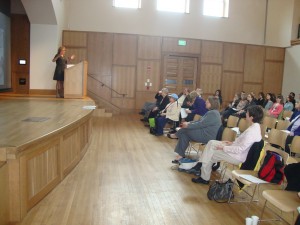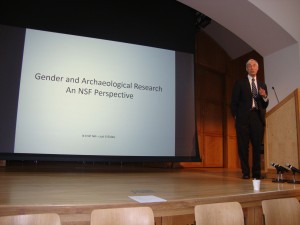By: Dr. Yoko Nishimura, Mellon Post-doctoral Teaching Fellow
Despite the rainy weather on March 29, our one-day symposium on “Women in Archaeology” was well-attended and was carried out with a great success at the University of Pennsylvania Museum of Archaeology and Anthropology.
Endowed with generous funds and kind supports from a number of institutions at Penn, prominent female archaeologists of all generations offered meaningful and thought-provoking talks. These presentations were followed by lively and stimulating discussions during afternoon panel sessions. Many challenging questions were raised especially by female graduate students in archaeology at Penn. All the invited speakers, panelists, and organizers quickly made friends and had such fun together during this event.
 The organizing committee members (Harold Dibble, Yoko Nishimura, Deborah Olszewski, Lauren Ristvet, and Salam al-Kuntar) are all colleagues at the Department of Anthropology at Penn. We launched this project with a strong belief that archaeology is a field that has traditionally been dominated by men, and even though women tend to outnumber men in undergraduate programs, their numbers decline significantly through graduate school and ultimately in tenured positions. Why such a decline occurs is one of the questions that we wanted to explore at this workshop. Women rarely take on the role of Project Directors, and instead are more typically included as senior personnel, lab specialists, or collaborators. In this event, one of our aims was to consider how the situation that archaeologists face has changed over the last fifty years. By bringing together women of all ages, we were able to build a time perspective and to address the question of whether these issues have improved over the past several decades, if they have stayed the same, or even deteriorated.
The organizing committee members (Harold Dibble, Yoko Nishimura, Deborah Olszewski, Lauren Ristvet, and Salam al-Kuntar) are all colleagues at the Department of Anthropology at Penn. We launched this project with a strong belief that archaeology is a field that has traditionally been dominated by men, and even though women tend to outnumber men in undergraduate programs, their numbers decline significantly through graduate school and ultimately in tenured positions. Why such a decline occurs is one of the questions that we wanted to explore at this workshop. Women rarely take on the role of Project Directors, and instead are more typically included as senior personnel, lab specialists, or collaborators. In this event, one of our aims was to consider how the situation that archaeologists face has changed over the last fifty years. By bringing together women of all ages, we were able to build a time perspective and to address the question of whether these issues have improved over the past several decades, if they have stayed the same, or even deteriorated.
The symposium started with presentations by seven female archaeologists (Anta Montet-White, Alison Brooks, Beth Alpert Nakhai, Barbara Roth, Gilliane Monnier, Teresa Raczek, and Lara Fabian) from all stages in their careers, from Professor Emerita to graduate student. Many of their talks were anecdotal in content, reflecting their experiences that they had working in the field and how issues and conditions that face professorial female archaeologists have changed over the last 60 or so years. Through these talks, we recognized overall patterns in some of the key issues and situations that they have confronted as female archaeologists, as well as issues and situations that are unique to certain generations and/or to certain geographical regions of their researches. Many of the talks expressed important decisions, choices, and sacrifices, made at crossroads particularly between professional and private lives of these female archaeologists over years and decades.
 With the addition of the invited panelists (John Yellen, Brian Rose, and Richard Leventhal), the afternoon panel discussions began with an important presentation by John Yellen, providing his valuable insights and perspectives into issues that he observed in his role at the National Science Foundation. Showing data and accompanying statistics, some of the significant observations John presented include the rate of success of NSF awards and fellowships between male and female graduate students or between male and female “senior” researchers. John’s presentation was followed by the lively panel discussions, addressing such topics as the challenges that women face in directing projects and receiving funding, the loss of women interested in archaeology from undergraduates, though graduate school, to obtaining academic positions, and the issues that arise from doing archaeological fieldwork, most notably the effect that this has on families and relationships. The younger members of the audience, in particular, better appreciated how the various challenges being faced by women archaeologists could be overcome, at least to some degree.
With the addition of the invited panelists (John Yellen, Brian Rose, and Richard Leventhal), the afternoon panel discussions began with an important presentation by John Yellen, providing his valuable insights and perspectives into issues that he observed in his role at the National Science Foundation. Showing data and accompanying statistics, some of the significant observations John presented include the rate of success of NSF awards and fellowships between male and female graduate students or between male and female “senior” researchers. John’s presentation was followed by the lively panel discussions, addressing such topics as the challenges that women face in directing projects and receiving funding, the loss of women interested in archaeology from undergraduates, though graduate school, to obtaining academic positions, and the issues that arise from doing archaeological fieldwork, most notably the effect that this has on families and relationships. The younger members of the audience, in particular, better appreciated how the various challenges being faced by women archaeologists could be overcome, at least to some degree.
Our next step for the future will be to gather and organize more concrete data and to identify gender-related discrepancies in terms of the numbers of enrolled graduate students, the proposals to and acceptance rates for grants and fellowships, the application and acceptance numbers for tenure-track positions etc. One of our goals is to have these issues and situations be more relevant to men. We feel it important to promote discussions on the issues that men have in common with women, such as the effects that field work has on families, as well as to further raise men’s awareness of the issues that many female archaeologists face today.
~~~
All content provided on this blog is for informational purposes only. The American Schools of Oriental Research (ASOR) makes no representations as to the accuracy or completeness of any information on this blog or found by following any link on this blog. ASOR will not be liable for any errors or omissions in this information. ASOR will not be liable for any losses, injuries, or damages from the display or use of this information. The opinions expressed by Bloggers and those providing comments are theirs alone, and do not reflect the opinions of ASOR or any employee thereof.